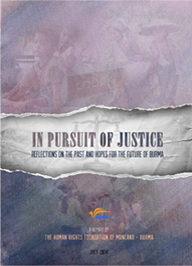In Pursuit of Justice: Reflections on the past and hopes for the future of Burma
July 7, 2014
Media release:
In order for Burma to successfully transition towards genuine democracy and national reconciliation, the Burmese government must address, and act upon, the specific needs expressed by victims of past human rights abuse, says the Human Rights Foundation of Monland (HURFOM) in a report released this morning. The 90-page report, titled In Pursuit of Justice: Reflections on the past and hopes for the future of Burma, details the history of human rights violations perpetrated in Burma’s ethnic minority areas, and analyzes how to repair the relationship between the government and citizens to rebuild trust and move through a peaceful transition towards a united future Burma.
 In Pursuit of Justice details the massive abuses of the previous military government to its minority ethnic communities, violations including land confiscation; forced labor and forced portering; physical abuse, torture, and murder; and rape and sexual abuse. In efforts to catalyze the implementation of appropriate mechanisms of justice, the report appeals to the government to provide adequate justice and possible reparations based on victims’ needs. Through this report, HURFOM hopes to hold a megaphone to the voices of Burma’s ethnic people regarding past human rights abuses.
In Pursuit of Justice details the massive abuses of the previous military government to its minority ethnic communities, violations including land confiscation; forced labor and forced portering; physical abuse, torture, and murder; and rape and sexual abuse. In efforts to catalyze the implementation of appropriate mechanisms of justice, the report appeals to the government to provide adequate justice and possible reparations based on victims’ needs. Through this report, HURFOM hopes to hold a megaphone to the voices of Burma’s ethnic people regarding past human rights abuses.
Furthermore, this report addresses victims’ expectations of the government for a future democratic Burma. Of utmost importance to building peace in Burma are three key elements of trust-building, national reconciliation, and transitional justice. The government must implement appropriate mechanisms to fulfill these three objectives in order to create sustainable peace throughout the country.
In order for real change to come to Burma, victims must have their voices heard, their pain recognized, and assured protection from any further future abuse. As Ye Township resident Nai Thein Thun explained to HURFOM field reporters during interviews for this report,
“Burmese soldiers torture and abuse local residents almost every month. We wanted upper level [military personnel] to know, and wanted them to seek justice for us. Young people should not keep silent, but [must] help each other, and raise awareness of the public. Even [within] this term of government, torture and abuse is still ongoing, so everyone should participate in finding a solution and seeking justice.”
In publishing this report, HURFOM’s Aue Mon, Coordinator of the Human Rights Documentation and Dissemination Program, states that the aim is “To strengthen the voices of Burma’s victims. Talking about transitional justice, at this point in time, may be viewed as an obstacle to the current reform, however, there are tens of thousands victims of past abuse who have been ignored by the government. The government refuses to accept accountability for past human rights violations, and failing to pursue accountability can weaken the rule of law and fuel the government’s culture of impunity. Thus, the government should at least acknowledge the suffering of its people from massive abuses. Through this report, HURFOM would like to suggest practical steps the government and international community can take in order to initiate the process for potential reparation and reconciliation mechanisms in the country. By doing so, we can restore trust and equality amongst the people of Burma and the government, as well as establishing the rule of law for the future Burma.”
Full PDF copies of In Pursuit of Justice can be downloaded here.
Hard copies of the report, as well as print-quality photos for news publication can be obtained by emailing monhumanrights@gmail.com.
Questions or requests for interviews in English, Mon and Burmese should be made by emailing auemon@gmail.com or calling +66 (0)86 167 9741
Comments
Got something to say?
You must be logged in to post a comment.



















































